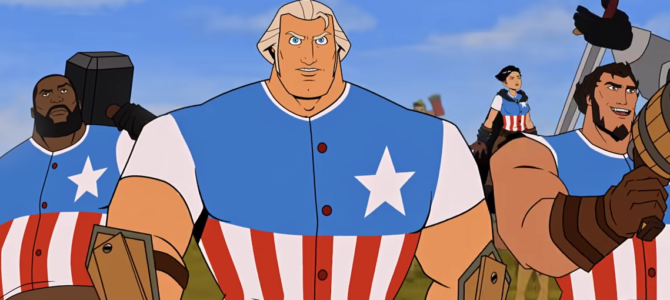
Imagine a multiverse where fantastic fictionalizations of all American historical figures exist simultaneously. George Washington and Abraham Lincoln are childhood friends. Benedict Arnold is a werewolf. Sam Adams is a beer-swilling fraternity president ready to found an army of bros.
Thomas Edison is a Chinese woman who veers closer to Tony Stark than the inventor of the lightbulb. Geronimo is there for some reason. Paul Revere is like Tarzan, but with horses instead of apes. John Henry is a small-business owner being crushed by taxes. Independence is on the menu.
In a nutshell, that would give you “America: The Motion Picture.” But don’t start getting excited, because as delightfully entertaining as it sounds, it’s terrible. It’s horrible. It’s one hour and 38 minutes of your life that you will never get back.
This is despite the pedigrees of some of those involved. It’s also possibly a result of the pedigree of one of the people involved. Writer David Callaham did also give us “Wonder Woman 1984,” after all. He also helped write “Doom” and “The Expendables,” so maybe the extent to which “America: The Motion Picture” fails is unsurprising.
But it was directed by Matt Thompson of “Archer.” It’s got Channing Tatum, Olivia Munn, Judy Greer, Will Forte, Killer Mike. Did I mention Benedict Arnold is a werewolf and the film’s conflict begins when Arnold rips out Abraham Lincoln’s throat at Ford Theater?
At best, the movie offers a few mild chuckles. More often, it offers eyerolls. It’s not just the constant over-the-top swearing. The f-bombs quickly go from gratuitous to perfunctory, as though every character has a quota. There are no straight men to provide balance. Every moment is turned up to 11 and one can tell the actors and filmmakers were laughing at their own jokes the entire time, like Jimmy Fallon on “Saturday Night Live” so many years ago, while everyone else wonders what’s so funny.
No one involved is committed to it. It also seems that no one involved was at any point telling them to settle down. Maybe if they’d had an on-set Newhart imploring them to “Stop it!” while also displaying deadpan comedic instinct and timing, they’d have salvaged the film. It’s highly unlikely, though.
The timing and kindergartener-telling-a-fart-joke flaws are not what dooms “America: The Motion Picture.” It’s the fact that no one involved seems to actually understand those they are trying to lampoon. 2017 seems a long time ago, but it was also a time when some writers set out across America to try to get the actual pulse of flag-waving, patriotic Americans. Callaham was obviously not one of those writers.
Edison’s character is constantly imploring those around her to listen to The Science. Adams’s brotastic beer-chugging persona is one-dimensional. Revere’s refrains of “You’re my human friends” and “I wasn’t raised by horses” don’t work the first time, much less every time he speaks. Channing Tatum’s Washington is largely forgettable except for his Wolverine-like arm-mounted chainsaws. Why they didn’t opt for a chainsaw bayonet is a mystery as the modus operandi for the movie seems to be “a little too on the nose.”
Insofar as the plot is concerned, I’ll skip it, not so much as to avoid spoilers but because you don’t need to waste any time reading about it. Suffice it to say there is a plot and the climax involves a giant fight scene.
First, though, Washington has to go to Y’all-Mart (HAHAHA!) to buy a bunch of AR-15s. There is a waiting period that lasts a few seconds. Then, he performs Lynrd Skynrd’s “Free Bird,” a bunch of new bros show up, battle ensues, and the good guys win when Martha Washington baseball-pitches a silver bullet to John Henry, who blasts it into Benedict Arnold’s head.
After that, all the extremely diverse citizens of a new country devolve into fighting and shooting one another with the AR-15s. There’s a joke about whether or not the Declaration of Independence included a right to healthcare. Maybe there’s another joke or two that were muffled by the sounds of my eyes rolling. All I know is that around that point, the movie mercifully ended.
None of these problems are really why it’s such a stupendously terrible movie, though. Instead, it’s that Callaham and Thompson wanted to laugh at “real” Americans rather than laughing with them. The end result is that no one is laughing, though maybe that’s the point.
In his farewell address, George Washington (the actual one) hoped he might serve “to guard against the impostures of pretended patriotism.” While he wasn’t peering into the multiverse and offering a warning to the makers of this flaming dumpster fire of a movie, he might as well have been.








